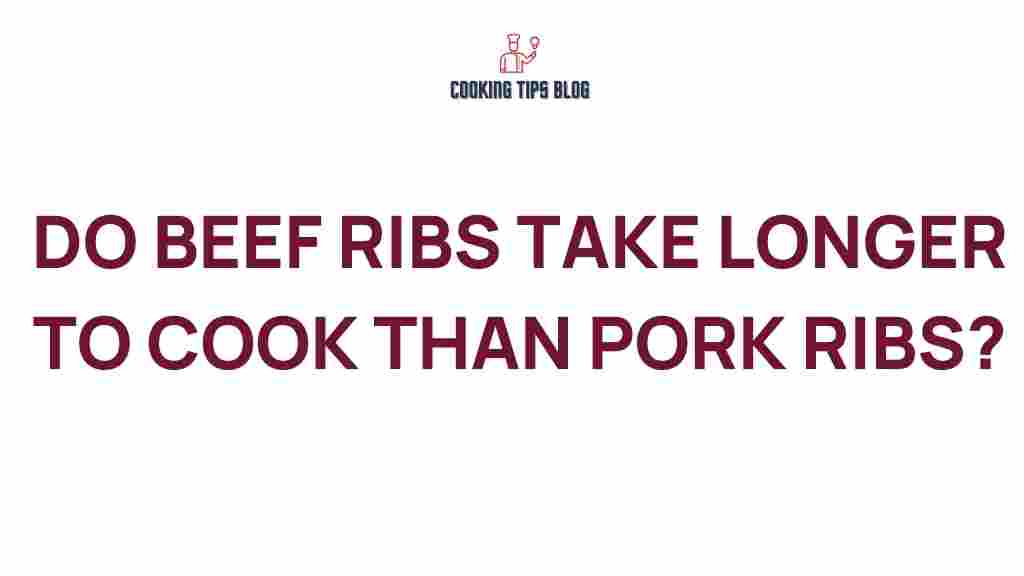The Great Rib Debate: Do Beef Ribs Really Take Longer to Cook Than Pork?
The world of barbecue is filled with passionate debates, but few topics ignite more discussion than the cooking times of different types of ribs. Among these, the comparison between beef ribs and pork ribs stands out. Many backyard grillers and professional pitmasters alike often wonder: do beef ribs really take longer to cook than pork? To answer this question, we need to delve into the characteristics of each type of rib, their cooking methods, and the factors that affect cooking time.
Understanding Beef Ribs and Pork Ribs
Before we compare the cooking times, it’s essential to understand what beef ribs and pork ribs entail. Each type of rib has unique features that can influence how they are prepared and cooked.
- Beef Ribs: Beef ribs are typically larger and meatier than their pork counterparts. They come in two main varieties: short ribs and back ribs. Short ribs are cut from the chuck or plate and have a rich flavor due to their marbling, while back ribs are taken from the rib section and are primarily bone with some meat.
- Pork Ribs: Pork ribs are usually more tender and have a higher fat content. The two most popular types are spare ribs and baby back ribs. Spare ribs are cut from the belly side of the pig and are larger, while baby back ribs come from the top of the rib cage and are smaller and more tender.
Factors That Affect Cooking Time
When discussing cooking times, several factors come into play:
- Size and Thickness: Beef ribs are generally larger and thicker than pork ribs, which can lead to longer cooking times.
- Fat Content: The higher fat content in pork ribs can render faster, leading to shorter cooking times compared to the leaner beef ribs.
- Cooking Method: Whether you are smoking, braising, or grilling can dramatically affect the cooking time for both beef and pork ribs. Low and slow is the preferred method for both.
- Bone Density: The bones in beef ribs are denser than those in pork ribs, which can impact heat conduction and cooking times.
Cooking Beef Ribs vs. Pork Ribs: A Step-by-Step Guide
To better understand the cooking differences, let’s explore a basic cooking process for both beef and pork ribs.
Cooking Beef Ribs
- Choose Your Ribs: Select quality beef ribs from your butcher or grocery store.
- Preparation: Trim excess fat and apply your favorite rub. Allow the ribs to marinate for at least 1 hour or overnight for optimal flavor.
- Preheat Your Grill or Smoker: Set up your grill or smoker for indirect heat, aiming for a temperature of 225°F to 250°F.
- Cooking Time: Cook the beef ribs for approximately 5 to 7 hours, depending on thickness. Use a meat thermometer to ensure they reach an internal temperature of 203°F for tender results.
- Resting: Allow the ribs to rest for at least 30 minutes before serving to let the juices redistribute.
Cooking Pork Ribs
- Choose Your Ribs: Opt for high-quality pork ribs, whether spare or baby back.
- Preparation: Remove the membrane from the back of the ribs and apply a dry rub. Let them sit at room temperature for 30 minutes.
- Preheat Your Grill or Smoker: Similar to beef ribs, set your grill or smoker to 225°F to 250°F.
- Cooking Time: Cook pork ribs for about 4 to 6 hours, depending on size. Aim for an internal temperature of 195°F to 203°F for perfect tenderness.
- Resting: Let the ribs rest for 15 to 20 minutes before slicing to keep them juicy.
Common Troubleshooting Tips
Even the most experienced cooks can run into issues when preparing beef ribs or pork ribs. Here are some common problems and solutions:
- Ribs Are Tough: If your beef ribs are tough, they may not have been cooked long enough. Consider wrapping them in foil and continuing to cook until they are tender.
- Dry Ribs: To avoid dryness, make sure to monitor the cooking temperature closely and consider spritzing the ribs with apple juice or vinegar during the cooking process.
- Flavorless Meat: If your ribs lack flavor, ensure you’re using enough seasoning. Marinating overnight or using a wet rub can significantly enhance the flavor.
- Uneven Cooking: To ensure even cooking, place the ribs in the center of the grill or smoker and rotate them halfway through the cooking time.
Conclusion: The Verdict on Cooking Times
So, do beef ribs really take longer to cook than pork? The answer is generally yes, due to their size, thickness, and lower fat content. While beef ribs may take around 5 to 7 hours to achieve optimal tenderness, pork ribs usually require only 4 to 6 hours. However, individual results may vary based on cooking methods and personal preferences.
Whether you prefer the robust flavor of beef ribs or the tenderness of pork ribs, understanding the nuances of each will elevate your barbecuing skills. Remember, practice makes perfect, so don’t hesitate to experiment with different techniques and flavors!
For more grilling tips and recipes, visit our BBQ Guide. If you want to explore the science behind cooking meat, check out this informative resource here.
This article is in the category Tools and created by Cookingtipsblog Team
